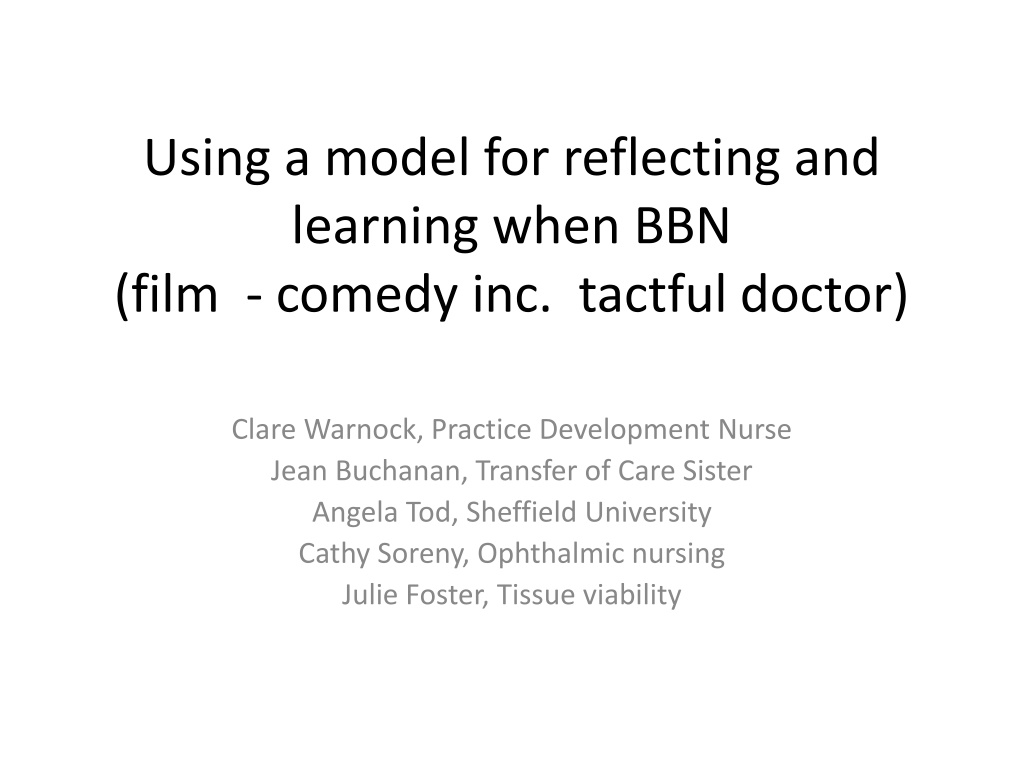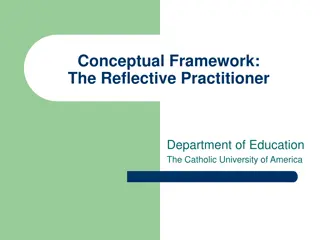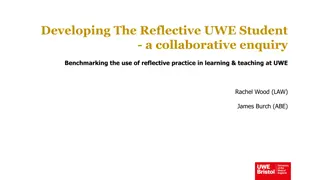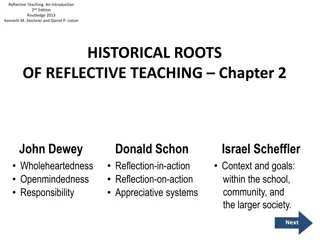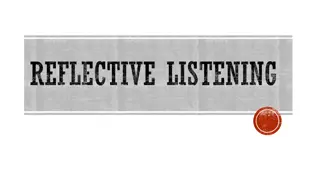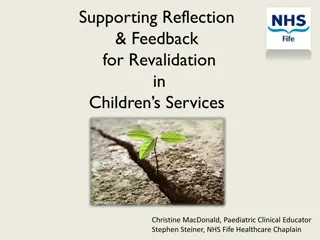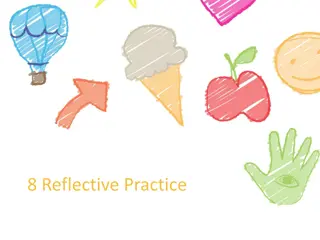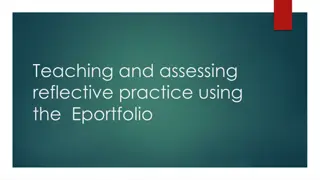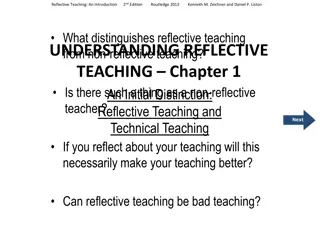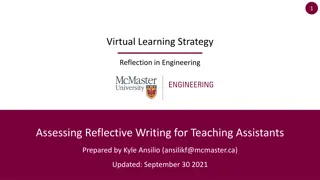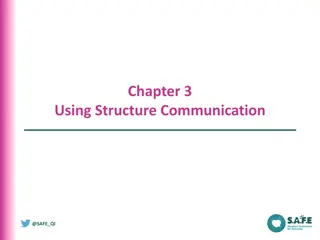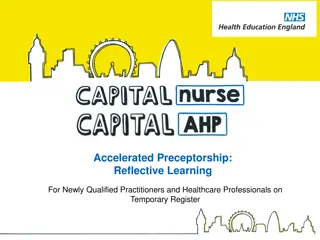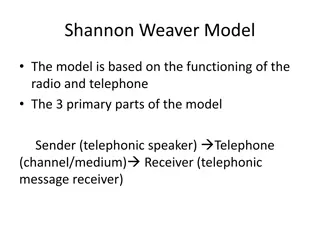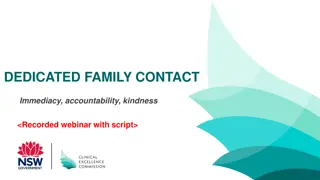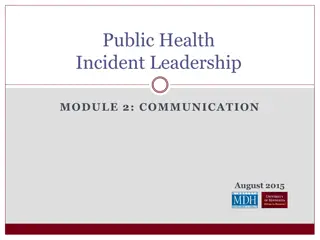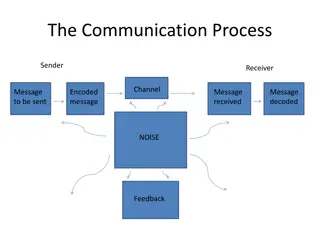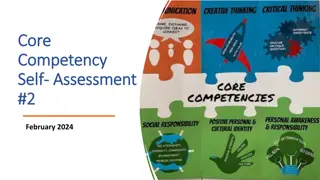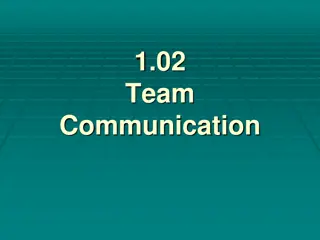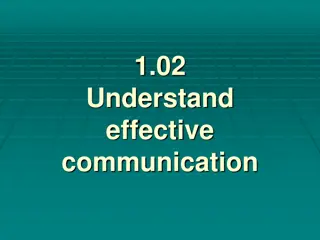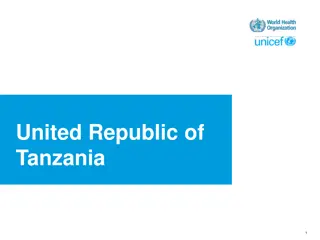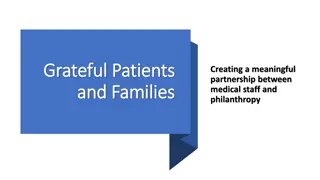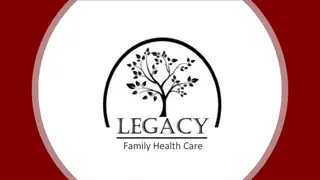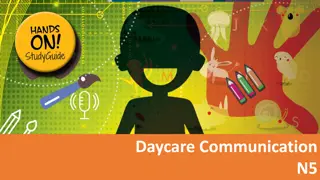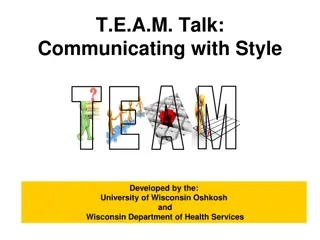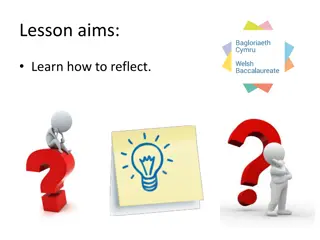Reflective Model for Improving Healthcare Communication
Utilizing a reflective model in healthcare settings allows professionals to analyze past events, identify areas for improvement, consider contextual factors, and examine personal actions. The model helps in avoiding self-blame, promoting positive reflection, and exploring potential changes for better outcomes. It incorporates elements such as organization dynamics, staff and service considerations, communication context, and challenges like difficult subjects and poor inter-departmental relationships.
Download Presentation

Please find below an Image/Link to download the presentation.
The content on the website is provided AS IS for your information and personal use only. It may not be sold, licensed, or shared on other websites without obtaining consent from the author. Download presentation by click this link. If you encounter any issues during the download, it is possible that the publisher has removed the file from their server.
E N D
Presentation Transcript
Using a model for reflecting and learning when BBN (film - comedy inc. tactful doctor) Clare Warnock, Practice Development Nurse Jean Buchanan, Transfer of Care Sister Angela Tod, Sheffield University Cathy Soreny, Ophthalmic nursing Julie Foster, Tissue viability
Why have a model? Understanding events What went well, what could be better Awareness of context and range of factors influencing situations What was me and how might I do things differently What was within or beyond my control Positive reflection: avoiding self blame What can be changed to make this better Might be me, might be bigger than this!
Where does the model come from? Study one nurses on wards 59 inpatient areas in STH took part in the study 236 questionnaires were returned 132 from medical areas, 60 surgical areas, 44 others e.g. ITU, neonatology, EBC Study two staff attending BBN study day 158 staff attended the study days 138 handed in their questionnaires 109 provided descriptions of difficult experiences
What does it look like.... Organisation Staff and services Situation The events and context Individual Knowledge, skills and experience of staff Patients and Relatives Reactions and family context
Situation Context of communication Difficult subjects o Not face to face o Unsuitable environment (event related) Tensions within the team o Complex ethical situations o Transitions in care o Emotive events Unexpected news/events o Situations mishandled by others o Sudden death/ deterioration o Disagreement over care / communication plan o False early reassurance o Information not anticipated o Poor team communication
Organisation Relationships between departments Poor communication transfer Time and staffing Not enough time/competing demands Staff not available e.g. inadequate staff levels, duty rotas, out of hours Services available Access to interpreters Delays in availability of tests, investigations and results Lack of appropriate spaces e.g. private, free from interruptions Information systems Who can give information When it can be given Formal and informal rules
Patients/relatives Reactions to news Emotionally heightened Non-acceptance, denial Family context Issues around disclosure Family dynamics Communication barriers Physical e.g. deafness, speech Language Comprehension: health related Comprehension: emotional response, e.g. overwhelmed Relationship breakdown with the healthcare team Disagreement over the care plan Challenging coping behaviours
Individual Individual resources Knowledge and skills Confidence Experience Balancing Doing the right thing and paying a price Taking responsibility and encountering challenges Learning from reflection and doubting own practice Emotional consequences Experiencing difficult emotions Identification and personal engagement
Balancing Patient coming to breast clinic with poor communication, relative not wanting to accept the news. I felt that I had not given them enough support and this resulted in my feeling I had let them down. I would have liked to be better prepared and I would have liked more info to give them. Rang a patient s son to say his mother was deteriorating. His reply was that he was just having a meal. Unfortunately, his mother passed away very quickly and I had to then ring him with the news that she had died. I found this very difficult as I was questioning myself about whether I had done enough and felt guilty that he was not there at the end.
Emotional consequences The patient was angry, shouting then introverted. I couldn t communicate with him at all. I felt inadequate, unprepared, upset, it has affected me emotionally as it was such a difficult situation When a young woman my age was diagnosed with bone mets. She was extremely shocked. Her diagnosis was extremely poor. I found it difficult to distance myself as our children were the same age and I could sense the devastation that was unfolding and her acute fear for her family.
When it doesnt go well Consequences were wide ranging Some shared some specific to themes More time /effort to manage and resolve issues Not being able to give the care they wanted to Doubts about own practice, feeling guilty Not feeling in control Frustration with colleagues Fractured relationships with patients/relatives
What might help? We identified that BBN was complex and often carried out in difficult circumstances Understanding the challenges can help Identifying why things go wrong reducing self blame for things that are not in our gift to change Thinking about future ways of improving services Situation, organisation, patients and family and self Being more prepared by anticipating events Getting resources to help May not always be more staff debrief, training, reading and reflecting
Using the model pairs exercise Look at the box you are reviewing Have you ever had a BBN situation when one or more of these factors has been an issue? Now scan the other boxes and identify if any of the other factors was also present With hindsight is there anything you would now do differently If you feel comfortable doing so share this with your partner Do you both agree on the factors that were involved?
Scenario A Mrs A lives alone at home. She is finding it increasingly difficult to cope as she can no longer cook her meals or get around her flat easily. She has had 5 falls in 4 weeks being found by her daughter when she visits. The daughter is struggling and wants her mum to have carers. Mrs A doesn t want this. You are a member of the community MDT and have been asked to visit by the GP. After your assessment you feel Mrs A does need carers to stay safe at home What factors (from the model) might contribute to making this discussion difficult? What could you do to help you with this
Scenario B Mr B has been having investigations into abdominal pain, weight loss and anaemia that have revealed he has colorectal cancer. He has come to clinic today for his test results. You are a nurse working in the clinic and he tells you he is anxious as he has no idea what the results might show. What factors (from the model) might contribute to making this a difficult BBN experience What can be done to make it less difficult
Scenario C Mr C has advanced heart disease and is nearing end of life. He is at home and has community nurse visits daily. He has a wife and 4 grown up children but there are obvious tensions in the family. You are the community nurse and Mr C has asked you on 2 occasions if he is dying, his wife has asked you not to tell him. What factors (from the model) might contribute to making this a difficult experience? What could you do to make it less difficult
Scenario D Mrs D was admitted today to the ward at 5pm. She is 87 and frail with long term COPD Her family visited but have gone home. They didn t speak with the nurses as they thought the nurses seemed to be too busy when they wanted to talk to them. Mrs D has fallen while walking unaided to the toilet. On review she has an obvious fracture in her forearm. You need to inform the relatives of the incident. What factors (from the model) might contribute to this being a difficult experience? What can you do to make it less difficult?
Scenario E Mr E has had a stroke. He has a left sided weakness but the MDT feel his function could improve He lives alone and has been told it is unlikely that he will get back home soon, there is talk of a rehab. facility MR E tells you that he can t see any point in doing his exercises as all he wants to do is go home. He is angry and refuses to talk about the plans for his care You are one of the team looking after MR E. You have been asked to talk to him about his discharge What factors (from the model) might contribute to this being a difficult discussion? What can you do to make it less difficult?
Scenario E Mrs A has been admitted with a fractured neck of femur following a fall at home. She is medically fit for discharge. This is her third admission following a fall Mrs A has 3 daughters aged between 38 and 50, 1 lives nearby the others down south (!) Mrs A says she wants to go home and doesn t need any carers. The 2 daughters who live away think their mum s wishes should be listened to. The local daughter thinks she needs community support as do the physio, OT and nurses. You have been asked to talk with Mrs A about discharge plans and the need for care. What factors might contribute to making this a difficult BBN experience? What might make it less difficult?
Scenario E Mr E is 40 and has 3 children aged between 4 and 8. He is a self-employed plasterer. He has a partner who is the main wage earner and works 20 miles away from home so Mr E does most of the childcare during the week. He fractured his leg playing football, has had surgery and will be unable to weight bear for 4 weeks What factors might contribute to this being a difficult experience? What might make it less difficult?
